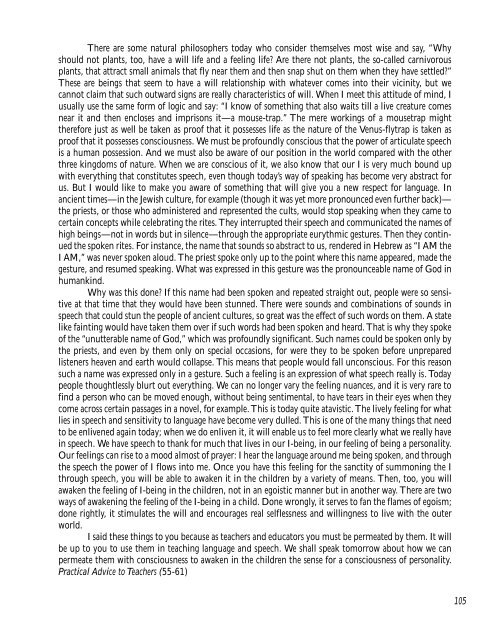Colloquium on English - Research Institute for Waldorf Education
Colloquium on English - Research Institute for Waldorf Education
Colloquium on English - Research Institute for Waldorf Education
Create successful ePaper yourself
Turn your PDF publications into a flip-book with our unique Google optimized e-Paper software.
There are some natural philosophers today who c<strong>on</strong>sider themselves most wise and say, “Why<br />
should not plants, too, have a will life and a feeling life? Are there not plants, the so-called carnivorous<br />
plants, that attract small animals that fly near them and then snap shut <strong>on</strong> them when they have settled?”<br />
These are beings that seem to have a will relati<strong>on</strong>ship with whatever comes into their vicinity, but we<br />
cannot claim that such outward signs are really characteristics of will. When I meet this attitude of mind, I<br />
usually use the same <strong>for</strong>m of logic and say: “I know of something that also waits till a live creature comes<br />
near it and then encloses and impris<strong>on</strong>s it—a mouse-trap.” The mere workings of a mousetrap might<br />
there<strong>for</strong>e just as well be taken as proof that it possesses life as the nature of the Venus-flytrap is taken as<br />
proof that it possesses c<strong>on</strong>sciousness. We must be profoundly c<strong>on</strong>scious that the power of articulate speech<br />
is a human possessi<strong>on</strong>. And we must also be aware of our positi<strong>on</strong> in the world compared with the other<br />
three kingdoms of nature. When we are c<strong>on</strong>scious of it, we also know that our I is very much bound up<br />
with everything that c<strong>on</strong>stitutes speech, even though today’s way of speaking has become very abstract <strong>for</strong><br />
us. But I would like to make you aware of something that will give you a new respect <strong>for</strong> language. In<br />
ancient times—in the Jewish culture, <strong>for</strong> example (though it was yet more pr<strong>on</strong>ounced even further back)—<br />
the priests, or those who administered and represented the cults, would stop speaking when they came to<br />
certain c<strong>on</strong>cepts while celebrating the rites. They interrupted their speech and communicated the names of<br />
high beings—not in words but in silence—through the appropriate eurythmic gestures. Then they c<strong>on</strong>tinued<br />
the spoken rites. For instance, the name that sounds so abstract to us, rendered in Hebrew as “I AM the<br />
I AM,” was never spoken aloud. The priest spoke <strong>on</strong>ly up to the point where this name appeared, made the<br />
gesture, and resumed speaking. What was expressed in this gesture was the pr<strong>on</strong>ounceable name of God in<br />
humankind.<br />
Why was this d<strong>on</strong>e? If this name had been spoken and repeated straight out, people were so sensitive<br />
at that time that they would have been stunned. There were sounds and combinati<strong>on</strong>s of sounds in<br />
speech that could stun the people of ancient cultures, so great was the effect of such words <strong>on</strong> them. A state<br />
like fainting would have taken them over if such words had been spoken and heard. That is why they spoke<br />
of the “unutterable name of God,” which was profoundly significant. Such names could be spoken <strong>on</strong>ly by<br />
the priests, and even by them <strong>on</strong>ly <strong>on</strong> special occasi<strong>on</strong>s, <strong>for</strong> were they to be spoken be<strong>for</strong>e unprepared<br />
listeners heaven and earth would collapse. This means that people would fall unc<strong>on</strong>scious. For this reas<strong>on</strong><br />
such a name was expressed <strong>on</strong>ly in a gesture. Such a feeling is an expressi<strong>on</strong> of what speech really is. Today<br />
people thoughtlessly blurt out everything. We can no l<strong>on</strong>ger vary the feeling nuances, and it is very rare to<br />
find a pers<strong>on</strong> who can be moved enough, without being sentimental, to have tears in their eyes when they<br />
come across certain passages in a novel, <strong>for</strong> example. This is today quite atavistic. The lively feeling <strong>for</strong> what<br />
lies in speech and sensitivity to language have become very dulled. This is <strong>on</strong>e of the many things that need<br />
to be enlivened again today; when we do enliven it, it will enable us to feel more clearly what we really have<br />
in speech. We have speech to thank <strong>for</strong> much that lives in our I-being, in our feeling of being a pers<strong>on</strong>ality.<br />
Our feelings can rise to a mood almost of prayer: I hear the language around me being spoken, and through<br />
the speech the power of I flows into me. Once you have this feeling <strong>for</strong> the sanctity of summ<strong>on</strong>ing the I<br />
through speech, you will be able to awaken it in the children by a variety of means. Then, too, you will<br />
awaken the feeling of I-being in the children, not in an egoistic manner but in another way. There are two<br />
ways of awakening the feeling of the I-being in a child. D<strong>on</strong>e wr<strong>on</strong>gly, it serves to fan the flames of egoism;<br />
d<strong>on</strong>e rightly, it stimulates the will and encourages real selflessness and willingness to live with the outer<br />
world.<br />
I said these things to you because as teachers and educators you must be permeated by them. It will<br />
be up to you to use them in teaching language and speech. We shall speak tomorrow about how we can<br />
permeate them with c<strong>on</strong>sciousness to awaken in the children the sense <strong>for</strong> a c<strong>on</strong>sciousness of pers<strong>on</strong>ality.<br />
Practical Advice to Teachers (55-61)<br />
105

















